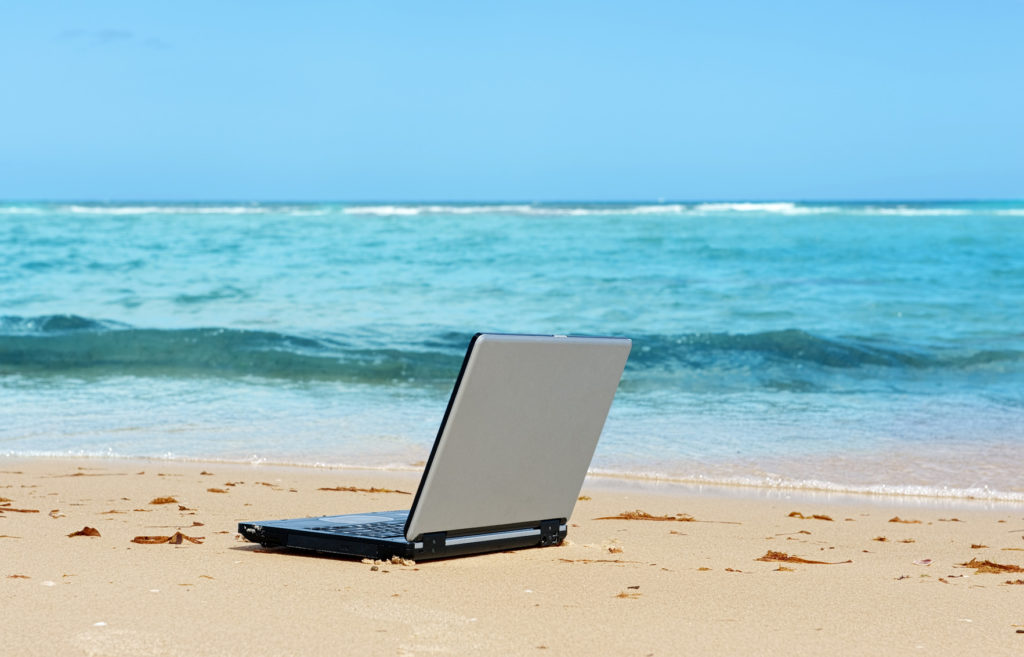| Vi bestræber os på at have vores hjemmeside på så mange sprog som muligt, dog er siden lige nu maskinoversat ved hjælp af Google Translate. | Luk |
-
-
produkter
-
resurser
-
support
-
firma
-
-
Startside
-
Ressourcer
- Blog
- Fem tip til beskyttelse af dit privatliv, mens du er på ferieFive Tips for Protecting Your Privacy While on Vacation

Du skal på ferie, men det betyder ikke, at du ikke vil obsessivt tjekke din e-mail og surfe på nettet. Hvilket betyder, at din computer er et sted, der er begravet i din bagage. Pokker, det vil sandsynligvis være den første ting, du pakker ud. Men har du tænkt på at beskytte dit privatliv, mens du er ude og blødgør solen? Måske ikke.
Dit privatliv er altid under angreb , men endnu mere når du rejser. Der er to ting, du vil gøre for at beskytte dit privatliv, mens du er på ferie. Først vil du holde de onde væk fra din computer. For det andet, hvis de tilfældigvis kommer ind, vil du have dem til at gøre så lidt skade som muligt. Med det i tankerne er her fem tip til beskyttelse af dit privatliv, mens du får en solbrun:
1. Adgangskode Beskyt din computer
Hvis du ikke rejser med din bærbare computer ofte, er den muligvis ikke adgangskodebeskyttet. Måske synes du, det er ondt at skulle indstille et kodeord, hvis du ikke planlægger at tage det uden for dit hotelværelse. At være på ferie kan gøre dig sløv, men det er ikke tid til at være doven. Medmindre du er parat til at stå vagt 24 timer i døgnet, er det en god ide at beskytte din bærbare computer med adgangskode. Du ved aldrig, hvem der har adgang til dit værelse.
2. Undgå usikret WiFi
For at komme online bruger du sandsynligvis offentlig WiFi, hvilket er okay. Men hvis du er interesseret i dit privatliv, forbliver du åben (dvs. usikret) WiFi. Med andre ord skal du sørge for, at den WiFi, du opretter forbindelse til, kræver en adgangskode. Og sørg for, at adgangskoden ikke er offentligt tilgængelig, generisk eller genbrugt.
3. Opret kun forbindelse til sikre websteder
I øjeblikket er du sandsynligvis fortrolig med sikrede websteder, der bruger HTTPS-protokollen. Som vist på nedenstående billeder, siger URL-adressen HTTPS, og de viser ofte en lille lås i adresselinjen.
Her er, hvordan du fortæller, om du gennemser et sikkert websted:

Brug af Chrome:

Brug af Microsoft Edge:

Brug af Mozilla Firefox:

Brug af Safari:
HTTPS giver dig mulighed for at kommunikere med dette websted via et krypteret link, hvilket er en fremragende måde at beskytte dit privatliv. Du bør begrænse al din online aktivitet, mens du er på ferie, kun til det websted, der er udstyret med HTTPS.
4. Sørg for, at der ikke er nogen personlig information på din bærbare computer
Den første ting hackere kigger efter på en computer er personlige oplysninger som telefonnumre, e-mails, adgangskoder og kreditkortnumre. Den bedste ting du kan gøre, selv før du rejser til ferie, er at tørre computeren ren af dine personlige oplysninger.
Personlige oplysninger kan gemme sig mange steder som logfiler, cacher, browser-cookies og lokale sporingsfiler. Sørg for, at du får dem alle. Hvis du ikke er sikker på, hvordan du finder og renser alle disse placeringer, kan du tjekke et produkt som ReviverSoft Privacy Reviver . Det gør alt for at finde og rengøre for dig.
5. Scan din bærbare computer med jævne mellemrum
Uanset hvor mange forholdsregler du tager, er der en chance for, at nogen smuttede noget malware på din bærbare computer, når du ikke kiggede. Det gør ingen skade og kan hjælpe dig med at sove bedre, hvis du en gang om dagen scanner din bærbare computer efter malware.
Da du er på ferie, skal du sørge for at vælge et scanningsværktøj som bruge ReviverSoft Security Reviver, der giver dig mulighed for at planlægge dine scanninger. Når alt kommer til alt ville du hader at skulle afbryde din surflektion for at tjekke for computerinfektioner.
Du behøver ikke gå på kompromis med dit privatliv, mens du er på ferie. Følg disse enkle tip, og gør det hårdt for de onde fyre.
Was this post helpful?YesNoGratis Driver Opdateringer
Opdater dine drivere på mindre end 2 minutter for at nyde bedre PC ydeevne - Gratis.
Gratis Driver Opdateringer
Opdater dine drivere på mindre end 2 minutter for at nyde bedre
PC ydeevne - Gratis.
Fandt du ikke dit svar?Stil et spørgsmål til vores fællesskab af eksperter fra hele verden og få svar på ingen tid overhovedet.most relevant nylige artikler Firma| Partnere| EULA| Juridisk bemærkning| Sælg/del ikke mine oplysninger| Administrer mine cookiesCopyright © 2025 Corel Corporation. Alle rettigheder forbeholdt Brugsbetingelser | Privatliv | CookiesFastgør det på Pinterest
-